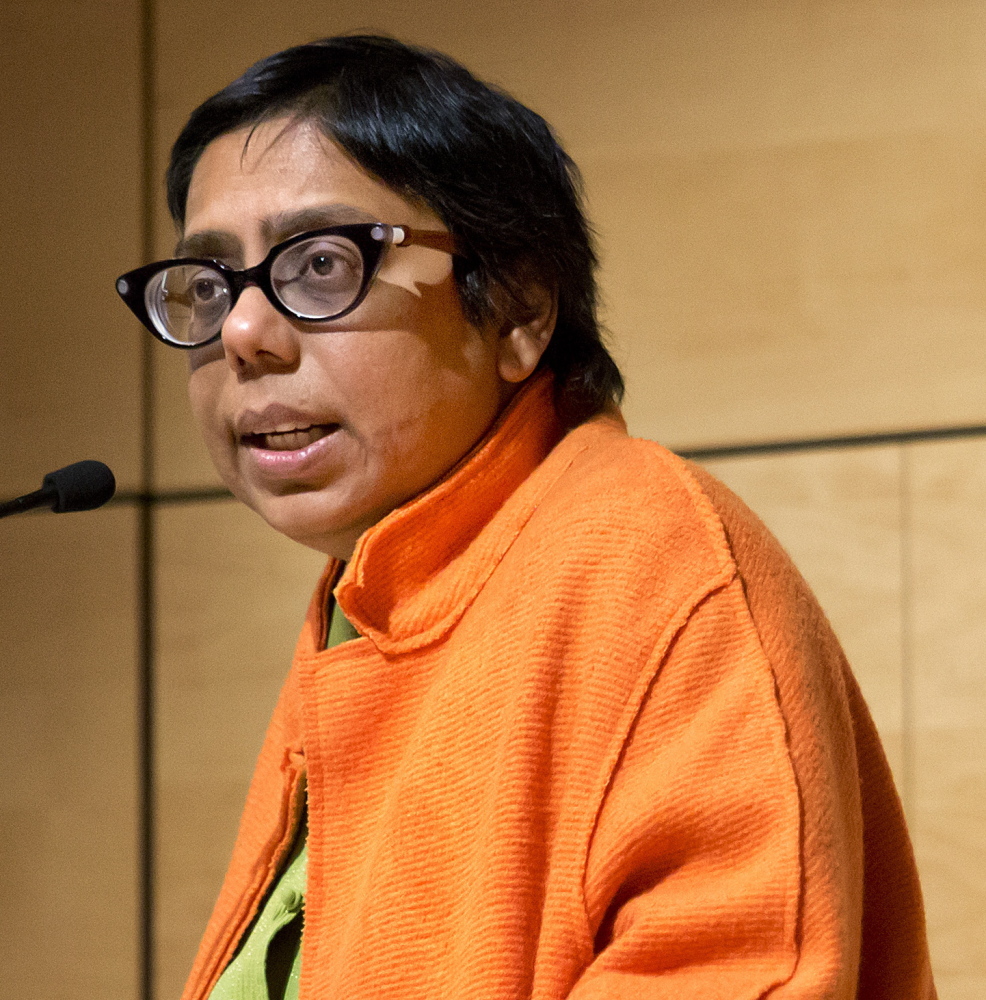Since arriving in Maine this week, one of the world’s most vocal leaders in the fight against human trafficking has been asked how countries should deal with trafficking and prostitution.
People want to know if legalizing prostitution should be considered, Ruchira Gupta told an audience of several hundred people who gathered on the campus of the University of Southern Maine on Thursday night.
“I tell them, ‘Absolutely not!'” Gupta said. “Prostitution is actually an absence of choice. Nobody chooses to be poor and vulnerable, and nobody chooses to be a woman.”
Gupta, an award-winning journalist from India, has become a global force in the battle against human trafficking. Her 1996 documentary “The Selling of Innocents,” which examined the sex trade between Nepal and India, won her an Emmy Award for outstanding investigative journalism. The documentary followed the flesh trade from its source in the poor mountain villages of Nepal to brothels in two of India’s largest metropolitan areas – Mumbai and Calcutta.
Gupta said her investigation began after she noticed that a large number of young girls were missing from villages. When she started to probe deeper – she was on an assignment unrelated to trafficking – she discovered that individuals in the villages were buying girls from their parents and selling them to traffickers in India. Most of the girls were between 9 and 13.
While working on the documentary, her life was threatened when she was at a brothel and a pimp put a knife to her throat. He released her after being surrounded by 23 women who worked for him, Gupta said.
“They told him, if you kill her, you have to kill all of us,” Gupta recalled. “The documentary was a life-changing experience for me. I couldn’t just walk away.”
Eighteen years later, Gupta travels the globe in her pursuit of justice for girls who are forced into the sex trade. Though her efforts have brought some progress, human trafficking continues in the United States, including in Maine.
Nationally, between 100,000 and 300,000 minors in the United States are engaged in commercial sexual exploitation, according to the Greater Portland Coalition Against Sex Trafficking and Exploitation. The U.S. Department of Justice estimates that most children entering the commercial sex industry in the United States are 12 to 14 years old.
Gupta describes human trafficking as a form of modern-day slavery. Federal law defines human trafficking as anyone under the age of 18 who is induced to perform labor or a commercial sex act through force, fraud or coercion.
“Human trafficking is a global issue, but it’s also a reality in the United States and in Maine,” said Peter Pitegoff, dean of the University of Maine School of Law. Gupta was invited to speak Thursday evening at the law school’s fourth annual Justice for Women lecture, held at USM’s Abromson Community Education Center.
Pitegoff introduced Dianne “dee” Clarke to the audience as a local advocate and mentor for victims of human trafficking. Clarke told the crowd that she became a victim of sex trafficking when she was 12 and worked in Boston’s Combat Zone for 12 years as a stripper and prostitute. It wasn’t until her mid-20s that Clark said she started coming out of “the life.”
“I was an emotional wreck. I had no idea I was being oppressed by my own shame,” said Clarke, who credited Gupta with giving her the courage to speak freely about “the horrendous way I used to live.”
“It’s because of the work you’ve done, Ruchira, that survivors are starting to speak out,” Clarke said.
Gupta is the founder and president of Apne Aap Women Worldwide, which has helped thousands of women in the sex trade access safe housing, education, job training and other resources.
More than 600 people registered for Thursday’s lecture, which was attended by Maine Attorney General Janet Mills, Chief Justice Leigh Saufley of the Maine Supreme Judicial Court and Sen. Justin Alfond, D-Portland.
During her weeklong visit, Gupta also spoke at Deering High School and Bates and Colby colleges. On Monday, she received the key to the City of Portland from Mayor Michael Brennan.
Send questions/comments to the editors.




Success. Please wait for the page to reload. If the page does not reload within 5 seconds, please refresh the page.
Enter your email and password to access comments.
Hi, to comment on stories you must . This profile is in addition to your subscription and website login.
Already have a commenting profile? .
Invalid username/password.
Please check your email to confirm and complete your registration.
Only subscribers are eligible to post comments. Please subscribe or login first for digital access. Here’s why.
Use the form below to reset your password. When you've submitted your account email, we will send an email with a reset code.